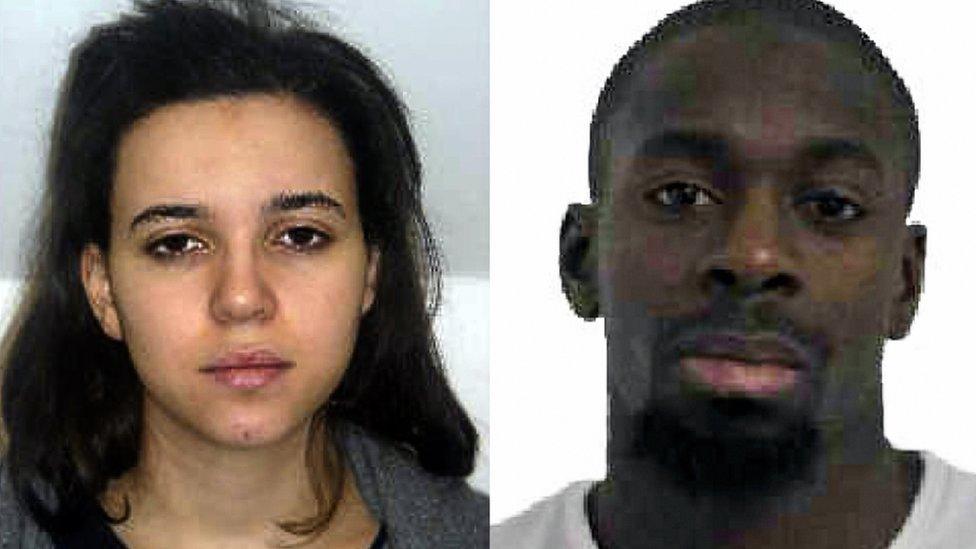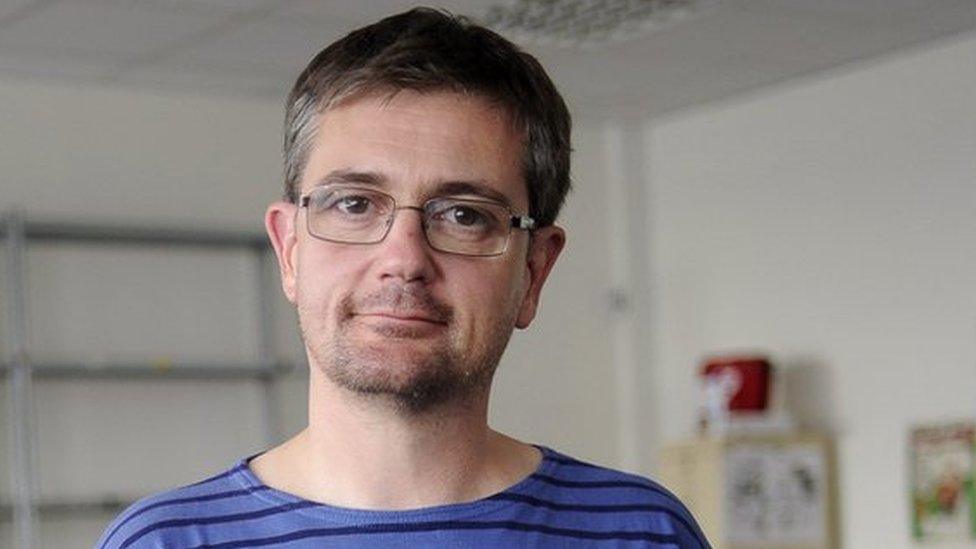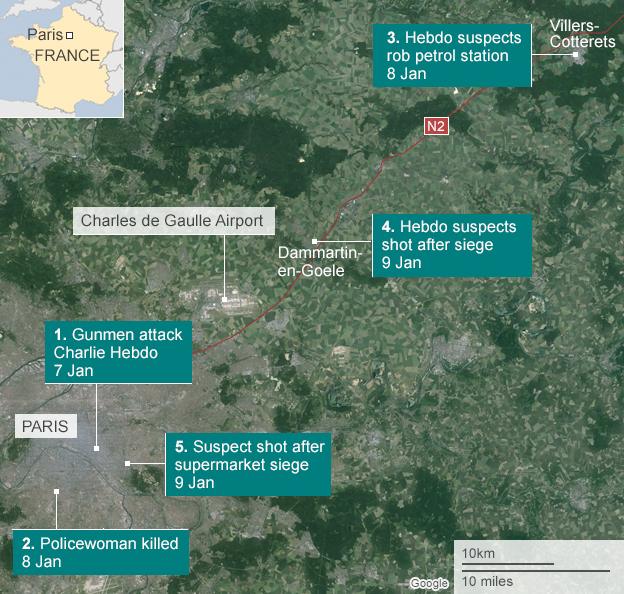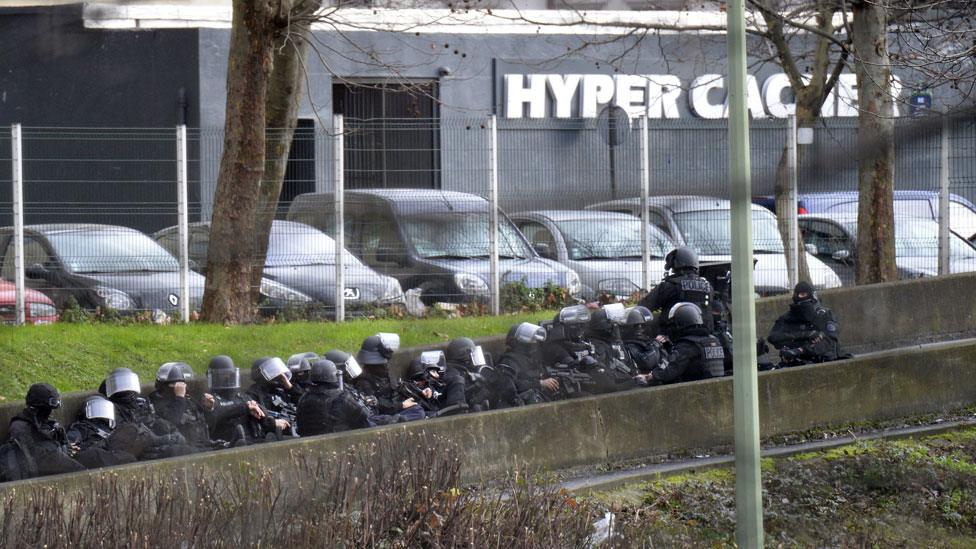Charlie Hebdo attack: France seeks long jail terms in Paris trial
- Published
The supermarket attacker's partner was caught on CCTV at an Istanbul airport days before the January 2015 attacks
France's anti-terror prosecutors have called for defendants on trial for a series of militant Islamist attacks in Paris to be given long jail terms.
The January 2015 attacks on Charlie Hebdo magazine, a policewoman and a Jewish supermarket left 17 people dead.
Fourteen people are appearing in court and three are being tried in absentia.
One of those being tried in absentia is Hayat Boumeddiene, the fugitive partner of Amedy Coulibaly who was killed after attacking the supermarket.
Two brothers are also being sought.
Prosecutors are seeking a life sentence for Ali Riza Polat, the main defendant, who is in court.
All three actual participants in the 7-9 January 2015 attacks were killed and the defendants, who went on trial in early September, are accused of obtaining weapons or providing logistical support. All 14 in the dock deny the charges and verdicts are expected on 16 December.
Prosecutor Julie Holveck told the court that all the defendants had "their share of responsibility" for the deadly process that led up to the attacks and she called for a "firm and balanced" response. It was not a question of making the living pay for the crimes of the dead, she insisted.
"They are the kingpin and backbone of this plot."
Who has been singled out by prosecutors?
Ali Riza Polat, described as Coulibaly's right-hand man, had a pivotal role in preparing the attacks and had a "precise knowledge of the terrorist plan", even if he disputed that, prosecutors allege. He has admitted taking part in "scams" but denies any knowledge of the plot.
It is unknown whether the three being tried in absentia are even alive, but prosecutors say Hayat Boumeddiene should be given a 30-year sentence with a minimum of 20 behind bars.

Boumeddiene was Coulibaly's partner who fled to Syria days before the January 2015 attacks
She fled France for Syria via Turkey a week before the attacks. Prosecutors say she took part in preparing the attacks and used a variety of methods to buy the weapons. She was thought to have died in a US air strike last year but a female jihadist told French security services she had escaped from a camp for militant detainees late last year.
As for the other two defendants being tried in absentia, prosecutors want Mohamed Belhoucine, a close friend of Coulibaly, to be jailed for life with a minimum tariff of 22 years behind bars for complicity in his attack on the Hyper Cacher supermarket which left four people dead. Belhoucine is suspected of giving the killer the most significant operational support as well as acting as his religious mentor. Prosecutors want his younger brother, Mehdi, to face 20 years in jail for helping Hayat Boumeddiene escape.
Of the other defendants present in court, prosecutors want 11 to face heavy jail terms of 13 to 20 years for helping the three killers.
Nezar Mickaël Pastor Alwatik was with Coulibaly in jail and his DNA was found on two pistols at his home, while Amar Ramdani and Saïd Makhlouf are alleged to have provided weapons. The trio are described as being part of a support group based in Lille in northern France.
Four others, based in the Ardennes area of Belgium, should also face long sentences, prosecutors say.
What happened in January 2015?
On 7 January 2015, brothers Chérif and Saïd Kouachi stormed the Paris offices of Charlie Hebdo in the Rue Nicolas-Appert before opening fire on its staff and murdering 11 people including five of the satirical magazine's cartoonists.
A police officer was murdered outside the building. The Kouachis were killed in a shootout with police two days later.

Editor Stéphane Charbonnier was among five cartoonists
On 8 January Coulibaly shot dead a woman police officer in the Paris suburb of Montrouge.
The next day he took hostages in Hyper Cacher, a kosher supermarket, killing an employee and three customers. Coulibaly was eventually shot dead in a police raid.
Charlie Hebdo marked the start of the trial in September by reprinting controversial cartoons of the Prophet Muhammad that sparked protests in several Muslim countries.
The following month, teacher Samuel Paty was murdered near his school by a Chechen, days after the teacher showed some of the cartoons to a class on free speech.


Related topics
- Published14 January 2015
